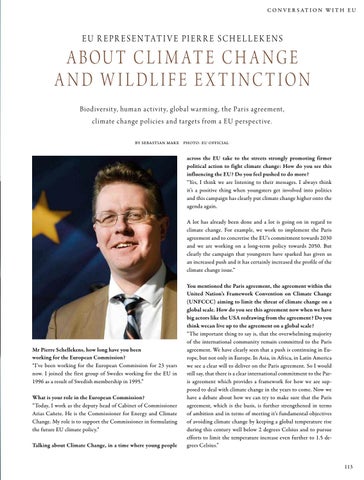C O N V E R S AT I O N W I T H E U
E U R E P R E S E N TA T I V E P I E R R E S C H E L L E K E N S
A BOU T C L I M A T E C H A N G E A N D W I LDLI FE E X T I NCT ION Biod iversit y, hu ma n activ it y, globa l wa r m i ng , t he Pa r is ag reement, cl i mate cha nge pol icies a nd ta rgets f rom a EU perspective. BY SEBASTIAN MARX
PHOTO: EU OFFICIAL
across the EU take to the streets strongly promoting firmer political action to fight climate change: How do you see this influencing the EU? Do you feel pushed to do more? “Yes, I think we are listening to their messages. I always think it’s a positive thing when youngsters get involved into politics and this campaign has clearly put climate change higher onto the agenda again. A lot has already been done and a lot is going on in regard to climate change. For example, we work to implement the Paris agreement and to concretise the EU’s commitment towards 2030 and we are working on a long-term policy towards 2050. But clearly the campaign that youngsters have sparked has given us an increased push and it has certainly increased the profile of the climate change issue.”
Mr Pierre Schellekens, how long have you been working for the European Commission? “I’ve been working for the European Commission for 23 years now. I joined the first group of Swedes working for the EU in 1996 as a result of Swedish membership in 1995.” What is your role in the European Commission? “Today, I work as the deputy head of Cabinet of Commissioner Arias Cañete. He is the Commissioner for Energy and Climate Change. My role is to support the Commissioner in formulating the future EU climate policy.” Talking about Climate Change, in a time where young people
You mentioned the Paris agreement, the agreement within the United Nation’s Framework Convention on Climate Change (UNFCCC) aiming to limit the threat of climate change on a global scale. How do you see this agreement now when we have big actors like the USA redrawing from the agreement? Do you think wecan live up to the agreement on a global scale? “The important thing to say is, that the overwhelming majority of the international community remain committed to the Paris agreement. We have clearly seen that a push is continuing in Europe, but not only in Europe. In Asia, in Africa, in Latin America we see a clear will to deliver on the Paris agreement. So I would still say, that there is a clear international commitment to the Paris agreement which provides a framework for how we are supposed to deal with climate change in the years to come. Now we have a debate about how we can try to make sure that the Paris agreement, which is the basis, is further strengthened in terms of ambition and in terms of meeting it’s fundamental objectives of avoiding climate change by keeping a global temperature rise during this century well below 2 degrees Celsius and to pursue efforts to limit the temperature increase even further to 1.5 degrees Celsius.”
113


































